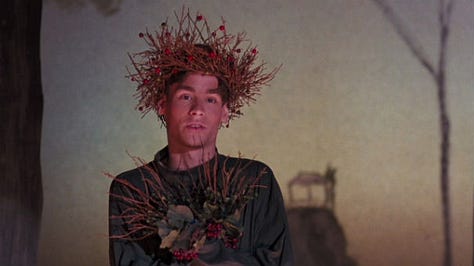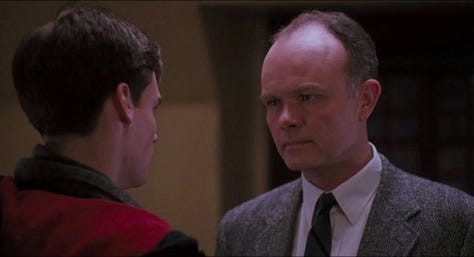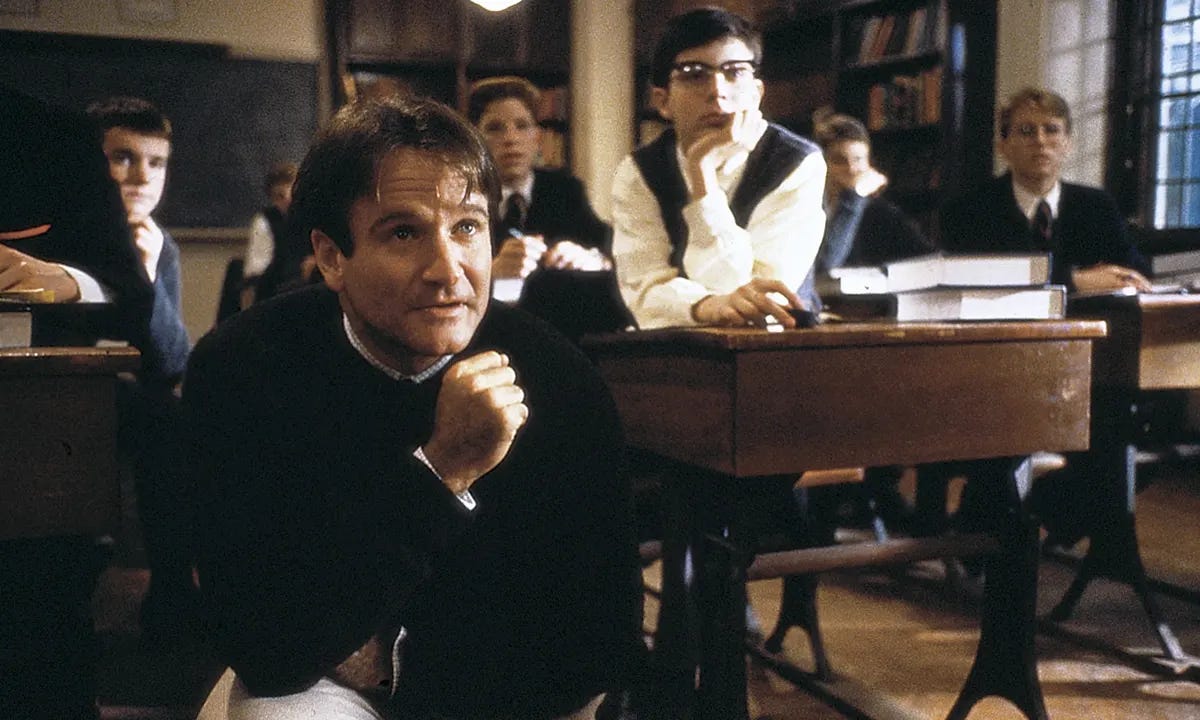Climb The Desk, See Differently
'Dead Poets Society' has an underrated takeaway
Yesterday I revisited a Robin Williams classic, the Dead Poets Society. This movie likely inspired a generation of English teachers, based on how many times this movie was shown to me in school by a teacher with a twinkle in their eye. Everyone fancies themselves the Williams character, Mr. Keating, who teaches his students about language, romanticism, and “carpe diem”. It’s a great movie and aged well. In a sense, Dead Poets is standard fare for the inspirational drama genre. Its main beats include a spunky teacher instilling nonconformity in his prep school students, overbearing parents who won’t accept their children’s passion for art, an authoritarian headmaster, and a bunch of messy boys searching for their identity in a school that takes no interest in the individual.
The movie is pure romanticism, all the way from its high points like the O’ Captain My Captain ending to the low points like the tragic suicide of a main character, taken by despair about his future.
When you’re young, you see yourself in the boys.
Their hopelessness about meeting parental expectations hits hard.
You love the teacher who sees them for who they truly are. Robin Williams captures the kind of mentor we all wanted at that age. I hope you had someone in your life that was like Keating.
Dead Poets is chock full of memorable takeaways and bumper sticker wisdom.
"No matter what anybody tells you, words and ideas can change the world.”
“Poetry, beauty, romance, love… these are what we stay alive for.”
“Carpe diem. Seize the day, boys. Make your lives extraordinary.”
But what about this one from Mr. Keating’s lessons…..
One afternoon, Keating jumps up on his desk and proclaims the necessity of seeing things from a different perspective. Have an open mind. Walk in another man’s shoes. Stand on the teacher’s desk where you can look out at the class. The kids and their desks would seem small.
It’s a little goofy and not that transcendent of a lesson compared to some other observations by Keating about life and love. It even feels a bit elementary.
“After an orange cloud — formed as a result of a dust storm over the Sahara and caught up by air currents — reached the Philippines and settled there with rain, I understood that we are all sailing in the same boat.”
- Vladimir Kovalenok, on seeing the Earth from space
But now as a parent of a 13-year-old, watching Dead Poets as a family last night, I took a new interest in elements of the movie I hadn’t cared about before. It’s like the old saying, “You never stand in the same river twice.” Since the water is always in motion, the river is new every single day. This is the case for rereading books you love and watching old movies again. You’re different today than you were yesterday or a decade ago.
I was standing on the desk. Seeing the movie as an adult. Seeing the kids not as my peers, but as kids.
“We must constantly look at things in a different way,” says Mr. Keating as the boys climb up on the desk to see the classroom from above.
I felt the pain of the parents who lost their son to suicide. Though their overbearing expectations are what pushed the child to end his life, I actually noticed the offhand detail about the family being lower-middle class and less wealthy than everyone else at the prep school. The parents also felt pressure, and their desire to improve their economic position in society overwhelmed their son. They weren’t bad people. They had developed tunnel vision, and I’ve been there before.



There’s a teacher (Mr. Nolan) early in the movie who questions Keating’s unorthodox methods in the classroom. He’s a bit of a totalitarian himself, and he debates Keating at the lunch table. What I never noticed when I was a kid was that Mr. Nolan does not dislike Keating, he actually quite enjoys him.
They spar, but you can see in a shared smile that they are simply two teachers who love knowledge and sharing it, but in different ways. When you’re young you don’t like Nolan.
Yesterday, I didn’t feel badly about him at all. Weird!
Mr. Nolan is also not a bad man. In fact, he says something true to Keating which is that the romanticism he values will open the boys up to more pain in their lives. This is true.
Keating expands the boy’s minds and their dreams, and when a dream gets crushed, a boy is crushed also, then buried.
It’s this part of the movie, climbing the desk, which is quite hard for teenagers to fully appreciate. They’re particularly self-centered creatures. I know cause I was one.
This is one of the great hurts Robin Williams touched on throughout his career: becoming an adult without losing the child inside. Like in his reimagined Peter Pan story, Hook, “All grown-ups are pirates.”
But we don’t want to be. Our priorities just change. We fall in love. We have kids. We start to need money and then fall for the lie that we always need more of it. Then we alienate those who we love and wonder how we lost our way in the first place. “I did it for them” these characters always say.
Climb the desk. Revisit something you “used to love” and see what you can see. I bet it’ll be different from when you were younger.





I have loved this movie since I was a kid. And as both a child and an adult my father and I have had many conversations about this very topic. This is part of the reason why this movie is so good.